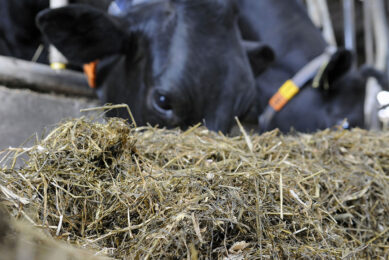Kung receives Dairy Nutrition Research Award
Dr Limin Kung, a rumen and silage fermentation expert in the dairy industry, was recognised for his professional achievements by the American Dairy Science Association (ADSA) earlier this month.
www.blueseal.comKung is a professor at the University of Delaware, where he has a research, teaching and extension appointment.
The Dairy Nutrition Research Award was presented to Kung during an ADSA event in Montreal, Quebec, Canada, on July 14. The award is sponsored by the American Feed Industry Association (AFIA), as part of its continuing awards programme that dates to 1948.
Clay Zimmerman of Blue Seal Feeds of Londonderry, NH, presented the award to Kung on behalf of AFIA; Zimmerman is a member of the AFIA Nutrition Committee.
Improving efficiency
Kung has attempted to conduct timely and applicable research to improve the efficiency of production and increase net-farm income on dairy farms throughout his career. He received his bachelor’s and master’s degrees from the University of Hawaii, and he earned his doctorate from Michigan State University.
Rumen metabolism
Kung is recognised for his research contributions in the areas of rumen metabolism and forage quality. Most notably, his research was crucial in gaining approval for the addition of Lactobacillus buchneri, approved by the Food and Drug Administration (FDA) in 2001, to silages.
This is the only bacterium that has been added to the original list of organisms approved for use in silage additives. His research played a pivotal role in the claim for improved aerobic stability with L. buchneri because it is the only silage inoculant approved by FDA to legally make this claim.
Improving silage fermentation
His research group also showed that with drier forages, the use of a liquid-applied inoculant is more effective in improving silage fermentation than a similar formulation applied in a dry form because lack of sufficient water activity in dry forages limits the growth of added bacteria. This has resulted in increased use of liquid-applied inoculants.
In addition, his group documented that the viability of some microbial inoculants is greatly compromised if the temperature of the water mix becomes too hot. Thus, many producers now check water temperatures in tanks to ensure the inoculants remain viable.
Timely research topics
Kung and his fellow researchers also focused on timely research topics including high cutting of corn silage, the use of BMR corn silage, the use of oxygen-barrier plastics for covering bunker silos, and other areas of dairy nutrition. He conducted some of the first lactation trials on directly adding enzymes to total mixed rations and the use of essential oils for lactating dairy cows. Furthermore, his early pioneering research on inhibiting sulfide production in the rumen is currently a topic of renewed interest because of high-sulfate water and the increased use of distiller’s grain.
Since 1999, Kung and his colleagues have published their findings in 32 peer-reviewed articles and have presented 49 research abstracts at major meetings. Kung also published three book chapters and numerous articles in the popular press and Extension newsletters in the same time frame. In the last ten years, Kung has made more than 400 presentations in 28 states, and 77 presentations in 11 other countries.
Related websites:
University of Delaware
American Feed Industry Association (AFIA)
American Dairy Science Association (ADSA)
Food and Drug Administration (FDA)
Blue Seal Feeds
University of Hawaii
Michigan State University











